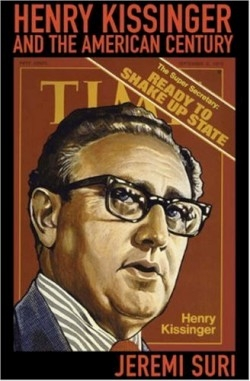Henry Kissinger and the American Century
Henry Kissinger was likely the most controversial Secretary of State in American history, reviled by his detractors but respected by heads of state throughout the world. Unlike several earlier Kissinger biographies, Suri presents a thoughtful, dispassionate appraisal of how Kissinger’s roots molded him as a man and informed his political theories that became America’s often-controversial foreign policy during the 1960s and 1970s. The author holds a Ph.D. in history from Yale and is a professor of history at the University of Wisconsin-Madison. He is the author of the prize-winning, Power and Protest: Global Revolution and the Rise of Détente.
This is not a traditional biography, but rather an investigation of how Kissinger’s life experiences affected his political writings and his diplomacy. Kissinger’s traumatic childhood in Nazi Germany is depicted as his defining root. For the first fifteen years of his life, until the Kissinger family emigrated to the United States in 1938, the Kissingers endured anti-Semitism, in the forms of beatings and job loss: the young Kissinger lost thirteen relatives in the Holocaust, deaths that still haunt him. This made Kissinger wary of democracy and of uncontrolled mobs, like those who beat him and were complicit in the deportations and murders of his relatives. He believes centralized governments are more progressive and offer the most protection for its citizens, and that strong leaders, like those whom he admires—Bismarck, Metternich, Churchill, Adenauer—provide essential protection against anarchy.
Kissinger continued his World War II-interrupted education at Harvard, the nation’s most renowned “Cold War University,” from which he received his Ph.D. in 1954. His research advocated the use of limited nuclear weapons as a diplomatic strategy—the stick used to encourage adversaries to negotiate. As National Security Advisor, he ineffectively and dangerously played the nuclear card in confrontations with Vietnam and the Soviet Union.
Richard Nixon and Kissinger shared a loathe-hate relationship, in which Nixon’s anti-Jewish rants were especially galling to Kissinger who remained an outsider, despite his elevation to Secretary of State, in the Nixon administration. Suri lauds Kissinger for essentially running the government when Watergate overwhelmed Nixon, and he praises Kissinger for his Middle East diplomacy between Israel and Egypt, a peace that continues to hold, despite living conditions in these countries and other Middle East nations that have led to the rise of terrorism.
The author, in this skilled historical investigation, acknowledges Kissinger’s mixed legacy, especially his support of repressive governments, but concludes that this “revolutionary diplomat” transformed American foreign policy by offering “policy beyond slogans,” which no contemporary diplomat has yet equaled.
Reviewed by
Karl Helicher
Disclosure: This article is not an endorsement, but a review. The publisher of this book provided free copies of the book to have their book reviewed by a professional reviewer. No fee was paid by the publisher for this review. Foreword Reviews only recommends books that we love. Foreword Magazine, Inc. is disclosing this in accordance with the Federal Trade Commission’s 16 CFR, Part 255.

